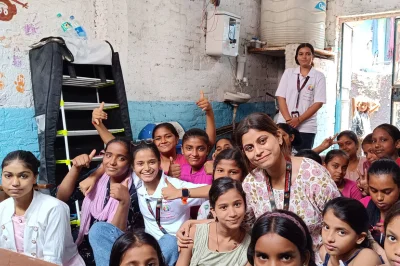PROJECT PRAKRITI IN SLUM AREA

PROJECT PRAKRITI IN SLUM AREA
Introduction
Women and young girls across age groups have been subjected to various forms of discrimination and stigma just by virtue of experiencing the natural process of menstruation. The taboo around menstruation has impacted the social and economic development of women, and has impacted their participation and presence in schools, other public spaces, and even in households.
Therefore, there is a constant need to normalize the natural and empower women in their adolescence to understand the female body, cater to the best menstrual hygiene practices, improve their overall menstrual and physical health, and increase their participation in private and public spaces. Project Prakriti is designed not only to build knowledge on menstruation but also to bring behavioral change, challenge the societal norms and perceptions around menstruation, and create a safe, respectful, and better world for women.
Project Prakriti in Slum Areas
Project Prakriti will focus on capacity building and behavioral change in the context of menstrual health and hygiene amongst adolescent girls aged between (9 and 18 years). This project in slum areas will sensitize the community towards the natural and essential process of menstruation and impart much-needed knowledge and awareness on best practices for menstrual hygiene.
Slum: Okhla Phase 1 Kalyan Vihar Delhi
To ensure the smooth execution of the project activities in the Slum of Okhla Phase 1 Kalyan Vihar Delhi, the team initially informed all relevant local authorities and Non-Profit organization including the Anganwadi centers, ANM, ASHA workers, dwellers, youth societies, about Project Prakriti pre-survey and the Shining Souls Trust. After receiving a positive response and securing their support, the team began implementing the project activities at the grassroots level in the slums. This collaborative approach facilitated effective engagement and ensured that the project's objectives were addressed in a community-centered manner.
The following activities were carried out
1. Pre Survey
To gain a grassroots understanding of menstrual health and hygiene issues among Girls ( 8 to 18 Years) in Slum of Okhla Phase 1, A pre-survey was conducted by The survey our Survey Interns involved one-on-one interviews using Google Forms, with the majority of girls (8 to 18 Years) responding via mobile phones. In total, 40 girls from the Specific area participated in the survey. This survey provided valuable insights into the common menstrual health and hygiene problems faced by the Girls in the community, revealing prevalent unhealthy practices and areas of concern.
Key Findings of the Survey
1. Product Used
Almost all respondents used commercially available sanitary pads. They are unaware of menstrual cups and tampons.
2. Hygiene practices
Most Girls change their menstrual hygiene product within 5-6 hours a day. 38% of girls change sanitary napkins from 9-12 hours a day due to unawareness of personal hygiene during their periods. However, a significant portion faced challenges due to a lack of private and clean facilities in the community.
3. Facility Availability
Community public washrooms often lacked proper facilities for menstrual hygiene management including disposal bins. 48.4% found unhygienic washrooms. Found no separate clean and private washrooms in the community.
4. Irregular Periods
Many girls reported experiencing irregular menstrual cycles.
5. Unawareness of Dietary Practices
There was a lack of awareness regarding appropriate food practices during menstruation.
6. Menstrual Cramps/ Mood Swing
68.4% of Girls face mood Swings and 32.6% suffer from Bloating, Nausea, Headache, Acne/ Pimples on the face, Cramps, and Body Pain.
7. Perceptions of Menstruation
A large proportion of girls do not consider menstruation a natural or sacred process. 63.4% discussed their period's experience with their friends. A very rare family plays a role in this.
8. Discrimination
Many girls face discrimination related to menstruation in their daily lives.
9. Barrier
78.8% of girls missout school and school activities.
Project Prakriti to be Continued...
Through our observations of the Pre Survey, we noted that community girls ( 8 to 18 years) tend to avoid discussing menstrual periods with their families. Despite a general awareness of menstrual hygiene, we identified some areas for improvement.
These include:
- Encouraging open discussions about menstrual periods and hygiene within families.
- Addressing the issue of girls missing school and school activities due to menstruation.
- Overcoming negative attitudes and behaviors related to menstruation.
- Educating community members about alternative sanitary products like tampons and menstrual cups.
- Encouraging open discussions about menstrual periods and hygiene within families.
- Addressing the issue of girls missing school and school activities due to menstruation.
- Overcoming negative attitudes and behaviors related to menstruation.
- Educating community members about alternative sanitary products like tampons and menstrual cups.